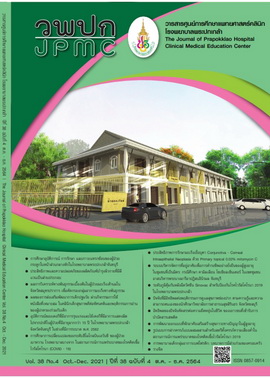Housing Governance for Sustainable Livelihood of the Elderly in an Age - Friendly Community: A Case Study of Camillian Social Centre in the Cathedral of the Immaculate Conception Community, Chanthaburi
Main Article Content
Abstract
BACKGROUND: As Thailand becomes an aging society, the search for suitable housing for the elderly requires a new public management system that is not only the responsibility of the government. One option is provided by the work of the Camillians, a non - profit organization. In the case of Chanthaburi Province, Thailand, the Camillians have been operating elderly nursing homes for a long time under the support of the Roman Catholic Church community. Therefore, with the aim of developing the work of the elderly nursing homes of the said private sector to broaden its roles, the researcher studied the factors affecting the management system of the Camillians’ elderly nursing homes. However, in order to expand such work more widely in Thai society, how should the model of the housing management system in the elderly friendly community be developed for sustainable living?
OBJECTIVES: The objectives of this study were to study the performance of a service system and factors affecting the housing governance for the elderly at the Camillian Social Center, Chanthaburi and to propose a model for the housing governance for the sustainable livelihood of the elderly in an age - friendly community in the context of Thai culture.
METHODS: Research methodology was used to study transdisciplinary approaches across disciplines by using a cross - disciplinary integrated research process based on quantitative and qualitative studies in chronological order. The key research techniques were document research, observation, lessons learned, and in - depth interviews with two Camillian executives, 10 operational staff, and 37 aged residents of the aforementioned center.
RESULTS: It was found that the factors affecting the management system of the Camillian Social Center were the community contexts that were friendly to the living of the elderly, including the religious community of the Cathedral of the Immaculate Conception or Roman Catholic Church, Chanthaburi. This was found to be a complex factor that was not a physical space dimension, but a religious relationship dimension, cultural capital, social capital, metagovernance service system, and social entrepreneurship model. In addition, the proposed management system model that should be applied in accordance with Thai culture should be considered from important factors, including the Thai community context that would be friendly to the livelihood of the elderly’s social capital in Thai society, Buddhist’style metagovernance, standard service system, and social entrepreneurship model. Moreover, it was found that the appropriate form for good management should be one of social entrepreneurship.
CONCLUSIONS: The important factors affecting the implementation of the nursing home management system were as follows: The community context should be friendly to the livelihood of the elderly, have cultural capital, social capital, metagovernance, service system, and a social entrepreneurship model. Moreover, the policy recommendations were the Camillians should apply the concept of Buddhist’style metagovernance in accordance with Thai culture. The Ministry of Social Development should also study the guidelines to support the expenses of the elderly to reside in a nursing home in the future. Likewise, social enterprise groups should come together as a cooperative mechanism.
Article Details
References
The Secretariat of The House of Representatives. Reform agenda 30: system reform for aging so-ceity. Bangkok : The Secretariat of The House of Representatives Publishing House ; 2015.
Daenggunlun C. The satisfsction of elders with the service of Elder Care Center in Maha Sarakham Province [Dissertation]. Maha Sarakham: Rajabhat Maha Sarakham University; 2010.
Kongmeung S. Stress and stress coping behavior of Thammapakorn Aging Home Officers, Chiang Mai Province [Dissertation]. Chiang Mai : Chiang Mai University; 2002.
Tatakorn W. Utilization of outdoor space in elderly housing project : a case study of Bangkhae Home for the Aged, Bangkok Metropolis [Dissertation]. Bangkok: Chulalongkorn University; 2004.
St. Camillus Foundation of Thailand. Camillian Home for the Aged [Internet]. 2017 [cited 2019 May 9]. Available form: https://www.camillianthailand.org/about-organization.html?id=4
Camillian Social Centre Chanthaburi. Camillian Social Centre Chanthaburi annual report. Chan-thaburi: Camillian Social Centre Chanthaburi; 2018.
Faculty of Social Development , The Development Association; National Institute of Development Administration. People's satisfaction with the service system and process of Bangkok Me-tropolis: case study of the district office Bangkok. Bangkok: National Institute of Development Administration; 1995.
Samukkhethum S. Good governance and corporate social responsibility. Bangkok: National Institute of Development Administration; 2018.
Ministerial Regulation: set standards place, safety and service in health establishments, elderly care business or people with dependency; 2020. Royal Thai Government Gazette 2020;137(61ก): 10-4.
Peters BG. Meta-governance and public Management”, In: Osborne SP; editor. The new public governance?: emerging perspectives on the theory and practice of public governance. London : Routledge; 2010. p 36-51.
Camillians. Serving with love of Camillians. Bangkok: B.T.A Best Supply;n.d.
King Prajadhipok’s Institute. Constitution of the Kingdom of Thailand B.E. 2560 (2017)). Bangkok: Cabinet and Royal Gazette Publishing Office; 2017.

